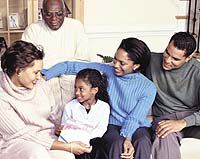| It’s important for families to hear about their ancestors as well as the history of grandparents. |
In native cultures, elders play an important role in transmitting knowledge to the younger generations and in interpreting the lessons that can be learned from traditional forms of teaching.
Maybe families should reestablish the role of the story teller in their midst?
Far too often, families miss out on opportunities to learn about their history forever. Asking questions about the past or the spontaneous telling of stories should be a part of our everyday lives.
Children shouldn’t hesitate to ask their parents and grandparents questions, because talking about the past does not equate denying the future. On the contrary, for seniors, talking about the past can be a comforting thing that gives new meaning to life.
For younger generations, hearing the stories of older people introduces them to their family’s culture and origins.
Fortunately, more and more seniors are writing their autobiographies, including anecdotes about their past, their marriage, and the events that were surrounded by joy or pain.
But many seniors may think they have nothing of interest to tell, or that only “literary authors” write down their memoirs. But they’re wrong, because anyone can do it. People can tell their life’s story in a number of ways: through videos, interviews, letters, family albums, recorded messages or songs.
Some stories are written by hand, others by typewriter and certainly others on computers. It doesn’t matter what a life history is, all life stories deserve to be told.

